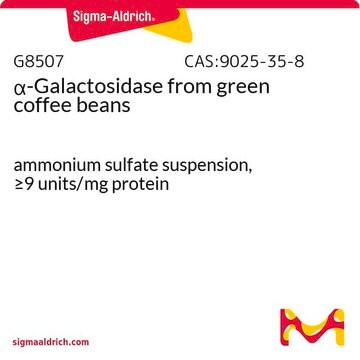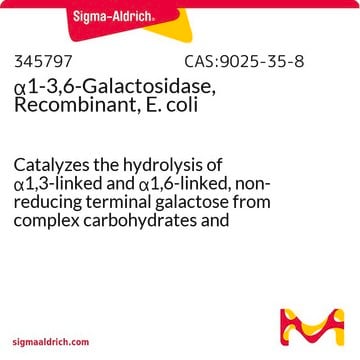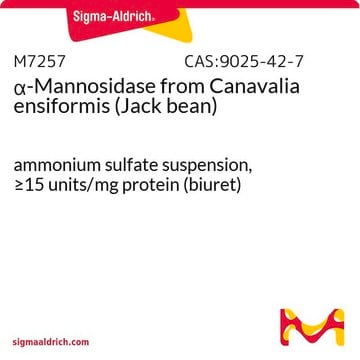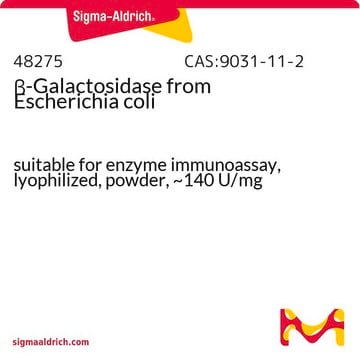G7163
α-Galactosidase, positionally specific from Escherichia coli
recombinant, expressed in E. coli, buffered aqueous solution
Synonym(s):
1,6-alpha-D-galactoside galactohydrolase, alpha-Galactosidase, melibiase
Sign Into View Organizational & Contract Pricing
All Photos(1)
About This Item
CAS Number:
MDL number:
UNSPSC Code:
12352204
NACRES:
NA.32
Recommended Products
recombinant
expressed in E. coli
Quality Level
form
buffered aqueous solution
specific activity
≥20 units/mg protein
mol wt
80 kDa
shipped in
wet ice
storage temp.
2-8°C
Gene Information
Escherichia coli CFT073 ... melA(1037886)
Related Categories
Biochem/physiol Actions
Cleaves α(1→3)- and α(1→6)-linked, non-reducing terminal galactose from complex carbohydrates and glycoproteins. It is particularly efficient for removing α-linked galactose under conditions where the pH must be neutral or above, for example, with live cells.
Unit Definition
One unit will hydrolyze 1 μmole of p-nitrophenyl α-D-galactopyranoside per min at pH 6.5 at 25 °C.
Physical form
This product is a sterile-filtered aqueous buffered solution.
inhibitor
Product No.
Description
Pricing
substrate
Storage Class Code
12 - Non Combustible Liquids
WGK
WGK 2
Flash Point(F)
Not applicable
Flash Point(C)
Not applicable
Certificates of Analysis (COA)
Search for Certificates of Analysis (COA) by entering the products Lot/Batch Number. Lot and Batch Numbers can be found on a product’s label following the words ‘Lot’ or ‘Batch’.
Already Own This Product?
Find documentation for the products that you have recently purchased in the Document Library.
Customers Also Viewed
K Schmid et al.
European journal of biochemistry, 67(1), 95-104 (1976-08-01)
The utilization by Escherichia coli K12 of raffinose as sole carbon source depends on a new raffinose transport system, an invertase and an alpha-galactosidase specified by the Raf-plasmid D1021. The alpha-galactosidase was purified to homogeneity from a mutant strain with
Shuo Gao et al.
Frontiers in chemistry, 9, 709581-709581 (2021-08-03)
For wide applications of the lacZ gene in cellular/molecular biology, small animal investigations, and clinical assessments, the improvement of noninvasive imaging approaches to precisely assay gene expression has garnered much attention. In this study, we investigate a novel molecular platform
Antonio Pisani et al.
Molecular genetics and metabolism, 107(3), 267-275 (2012-09-12)
Anderson-Fabry disease is an X-linked lysosomal storage disorder resulting from the deficiency of the hydrolytic enzyme alpha galactosidase A, with consequent accumulation of globotrioasoyl ceramide in cells and tissues of the body, resulting in a multi-system pathology including end organ
Multicomponent nanoparticles as nonviral vectors for the treatment of Fabry disease by gene therapy.
Aritz Pérez Ruiz de Garibay et al.
Drug design, development and therapy, 6, 303-310 (2012-11-03)
Gene-mediated enzyme replacement is a reasonable and highly promising approach for the treatment of Fabry disease (FD). The objective of the present study was to demonstrate the potential applications of solid lipid nanoparticle (SLN)-based nonviral vectors for the treatment of
Takura Wakinaka et al.
Glycobiology, 23(2), 232-240 (2012-10-24)
Bifidobacterium bifidum is one of the most frequently found bifidobacteria in the intestines of newborn infants. We previously reported that B. bifidum possesses unique metabolic pathways for O-linked glycans on gastrointestinal mucin (Yoshida E, Sakurama H, Kiyohara M, Nakajima M
Our team of scientists has experience in all areas of research including Life Science, Material Science, Chemical Synthesis, Chromatography, Analytical and many others.
Contact Technical Service










